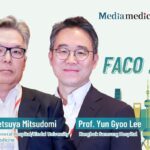On November 2, 2025, world-renowned hematology experts Professor Michael R. Bishop, Director of the Cell Therapy Center at the University of Chicago, and Professor Edmund K. Waller, the Rein Saral Distinguished Chair at Emory University, visited the Peking University Institute of Hematology for an academic exchange. 
The visit included ward rounds, thematic presentations, and in-depth discussions, during which both sides conducted extensive exchanges on the latest progress in cellular therapy for hematologic malignancies, pathways for clinical translation, and future development trends in the field.

Hospital Visit and Introduction
Guided by Professor Liu Jing, the visiting experts toured the hematology wards and gained a comprehensive understanding of the standardized hematopoietic stem cell transplantation (HSCT) protocols and patient management system at Peking University Institute of Hematology.

Academic Symposium
Chaired by Professor Zhao Xiangyu, the academic session brought together leading experts, including Professors Zhang Xiaohui, Xu Lanping, Yang Shenmiao, Lü Meng, Liu Jing, and Pei Xuying, marking the formal opening of the academic exchange.
Opening Remarks
In his welcoming speech, Professor Zhang Xiaohui expressed sincere appreciation to the visiting international scholars. He noted that hematopoietic stem cell transplantation and cellular therapy are currently at a critical stage of development, presenting both major opportunities and significant challenges. He emphasized that high-level international collaboration is key to fostering academic integration and accelerating the global advancement of hematologic disease treatment.

Institutional Presentation
Professor Liu Jing provided a comprehensive overview of the academic achievements, technological innovations, and clinical experience of Peking University People’s Hospital and its Institute of Hematology. She outlined the historical trajectory, current landscape, and future direction of HSCT in China.
She particularly highlighted the leadership of Academician Huang Xiaojun, under whom the institute achieved numerous landmark milestones in hematology. Among them, the “Beijing Protocol”—a pioneering non–ex vivo T-cell–depleted haploidentical transplantation system—successfully addressed the global donor shortage challenge. This protocol has since been adopted by hundreds of medical centers worldwide, earning widespread recognition and acclaim in the international medical community.
Keynote Lecture: Professor Michael R. Bishop

Professor Michael R. Bishop delivered a keynote presentation titled “Advances in CAR-T Cell Therapy for Lymphoma: Steps Toward Better Outcomes.”
Focusing on diffuse large B-cell lymphoma (DLBCL), he noted that while some patients achieve long-term remission or even cure with CAR-T therapy, many still fail to reach this goal. These limitations arise from factors such as disease biology, the tumor microenvironment, and T-cell dysfunction.
To achieve better outcomes, he emphasized several priorities:
- Earlier intervention in the disease course;
- Enhancing complete and durable response rates to prolong survival;
- Reducing treatment-related toxicity and developing new options for CAR-T–resistant patients;
- Improving accessibility and cost-efficiency, shortening the manufacturing-to-infusion timeline.
Professor Bishop also highlighted promising strategies such as signal-calibrated CD19-1XX CARs, second-generation 4-1BB–based dual-target CAR-T cells (CD19/CD20), and “armored” huCART19-IL18 constructs, which collectively expand the clinical armamentarium and represent a major step toward more effective CAR-T therapies.

Keynote Lecture: Professor Edmund K. Waller
Professor Edmund K. Waller from Emory University presented his pioneering research on “Targeting the Vasoactive Intestinal Peptide (VIP) Pathway for Cancer Immunotherapy.”
He systematically outlined the development of VIP receptor antagonists (VIPRa) as a novel class of immune checkpoint inhibitors, with potential applications in pancreatic cancer and acute myeloid leukemia (AML).
Professor Waller explained that VIP, produced by tumor and myeloid cells, exerts strong immunosuppressive effects. VIP receptor antagonists block the interaction between VIP and T cells, thereby enhancing immune activation.
Through in silico modeling, in vitro, and in vivo studies, his team identified potent candidates such as ANT308 and its Fc fusion protein CAMV-01, both showing high affinity for the human VPAC1 receptor.[Saut de retour à la ligne] In VIP-expressing murine myeloid sarcoma (P815) models, ANT308 not only induced complete tumor regression but also established protective immune memory, with sustained expansion of tumor-specific T cells.
Moreover, CAR-T VIPRa cells engineered to secrete ANT308 effectively blocked VIP-R signaling and exhibited enhanced antitumor activity and memory phenotype differentiation upon antigen stimulation.

Expert Discussion
Following the keynote talks, participants engaged in a dynamic discussion on the standardization of CAR-T clinical application and the translational potential of VIP pathway blockade, offering valuable academic insights for future research design and clinical implementation.


Special Reports from Peking University Experts
Professor Lü Meng addressed the clinical challenges of CAR-T therapy for T-cell malignancies, analyzing the barriers and possible solutions.[Saut de retour à la ligne] She reviewed current platforms—gene-modified, PEBL, and naturally selected CAR-T systems—covering autologous, donor-derived, and off-the-shelf products targeting antigens such as CD7 and CD5.[Saut de retour à la ligne] Her team’s ongoing IIT and IND studies, including PA3-17, aim to meet unmet clinical needs, with future work focusing on broadening targets and mitigating infection risks linked to CD5-directed therapies.

Professor Pei Xuying presented new findings on InstanCAR-T therapy for B-cell acute lymphoblastic leukemia (B-ALL).[Saut de retour à la ligne] She identified long manufacturing time and poor in vivo persistence as key limitations of traditional CAR-T therapy.[Saut de retour à la ligne] Her team’s next-day manufacturing platform preserves less-differentiated, stem-like T-cell phenotypes. In both preclinical and clinical settings, InstanCAR-T produced within three days showed robust persistence and potent anti-leukemic activity, potentially offering improved outcomes for B-ALL patients.

Conclusion
The meeting concluded with a comprehensive expert discussion and was hailed as a high-impact exchange of ideas and innovation.
This visit and academic dialogue not only fostered deep integration between international and Chinese expertise in hematopoietic transplantation and cell therapy but also established a strong foundation for continued collaboration.
The insights and research shared by all participants hold significant clinical and scientific value, providing direction for future translational studies and clinical optimization, and will undoubtedly propel China’s hematology research and cell therapy to new heights.


